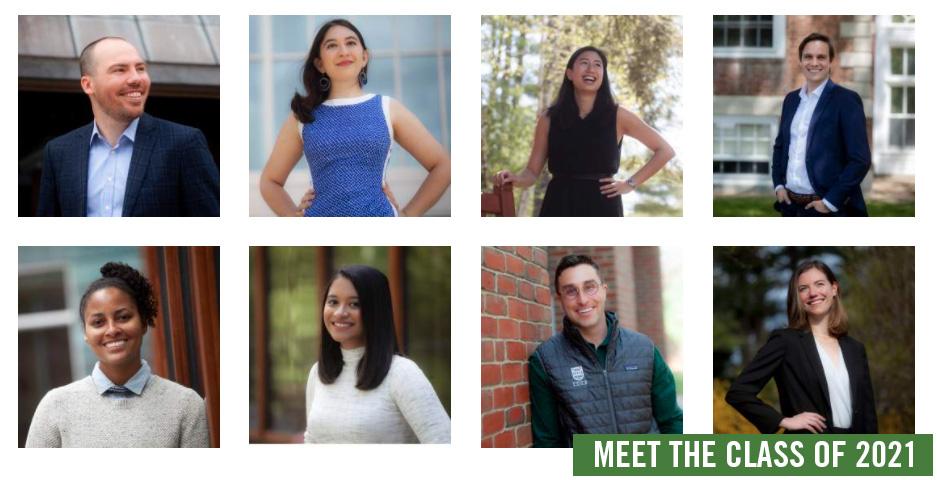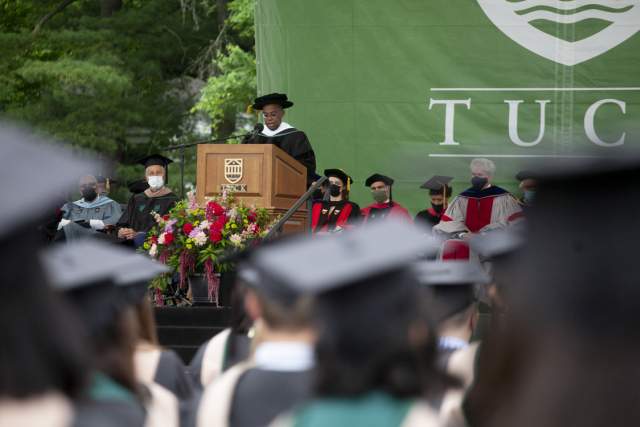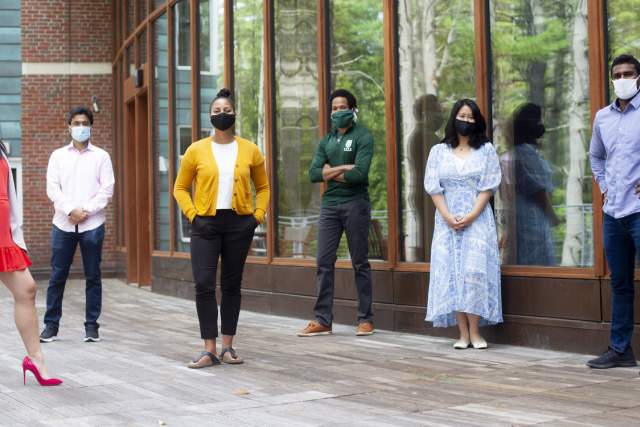Since she was often in the hospital volunteering and privy to the distress of families upset that couldn’t visit their loved ones, Livingston was conservative about going out around Hanover. But she found the experience grounded her even more to the Upper Valley, and connected her to the Dartmouth community at a deeper level. “That wouldn’t have been the case in a non-COVID business-school experience,” she says.
During this past winter, Livingston led a Visiting Executives Program event with Cuong Do T’89, a member of the Tuck Board of Advisors and the president of Samsung’s Global Strategy Group. “He said something that really resonated with me and it matched how I felt during most of the pandemic,” Livingston says. “He said ‘The universe owes you nothing. Nothing in your life is guaranteed. You make the most of what happens to you.’”
For Afolabi Oshinowo T’21, coming to Tuck was part of his strategy to improve the healthcare system in his home country of Nigeria. A licensed medical doctor, Oshinowo practiced medicine in Liberia during the Ebola epidemic, so he knew he had some experience that might help the Tuck community respond to COVID. As he saw the fear and uncertainty grip those around him, Oshinowo penned an email to all Tuck students with the subject line “A Word of Encouragement.” He urged everyone to not panic, avoid sensational news, and above all, be a good neighbor. “I remember that the experience in Liberia was emotionally exhausting,” he wrote. “It was always refreshing to have a friend or family check on me and just be a form of encouragement. It made a whole lot of difference. Please, let’s do so for one another.” He signed off with “We will overcome!!!!” He got dozens of responses and thank-yous, and learned that his email was forwarded to many friends and family members.
Before the first confirmed case in Hanover, Oshinowo met with the Deans and told them about strategies that would help curtail the spread of COVID, and how people in Liberia were able to protect themselves from Ebola. And throughout the pandemic, he sent thank-you notes to the Deans when he suspected they were dealing with especially challenging circumstances. “I knew the school was going through a tough time,” he says. “I looked for ways I could help make an impact or steer the ship in the right direction.”
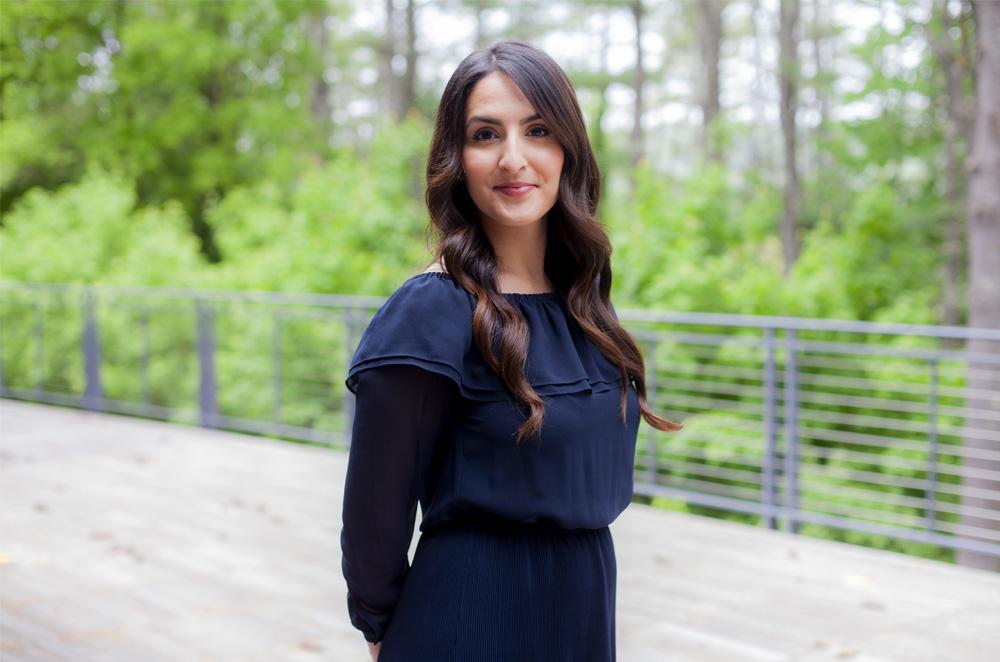
"I resolved to be more intentional with my time, to set up time with friends, to do the things on my Hanover bucket list, and to give back to the Tuck community. … Building relationships at Tuck with my classmates and the faculty has been really important to me."
—Shayda Teymourpour T’21
Shayda Teymourpour T’21 didn’t have Tuck on her short list of MBA programs. Born and raised in a small town in Illinois, Teymourpour figured she should go to business school in a city. Then she realized that Tuck’s unique learning environment would allow her both to focus on her education and be part of a tight-knit community. And even during the pandemic, Tuck came through for her on those points. The first year was more academically challenging than she expected, and she was able to self-source her FYP with Credo Beauty, a consumer beauty company, which was in the space she wanted to pursue after graduation. Then the pandemic arrived. After multiple terms of virtual classes and extra-curricular events, Zoom fatigue eventually set in. “I was always so energized by doing all the in-person engagements, both socially and professionally, but I ended up drained on Zoom,” she says.
The hardships gave her the impetus to step back and reflect on what she wanted out of these two years. Talking to her fiancé and friends, she homed in on a dream underlying her motivation to attend Tuck. “I decided that I didn’t want to go back and work for a corporation,” she says. “The pandemic highlighted how some companies treat their employees, and I learned what I really value in a company, so I pursued my own entrepreneurial venture—a direct-to-consumer skincare company rooted in Persian ingredients based on traditions passed down for generations in my family. I joined Tuck’s incubator and really hit the ground running on my venture. And I resolved to be more intentional with my time, to set up time with friends, to do the things on my Hanover bucket list, and to give back to the Tuck community. One of my favorite roles was serving as the Wellness Chair. I implemented a student partnership with a meditation app, and coordinated virtual and hybrid yoga, physical therapy and Pilates classes. Building relationships at Tuck with my classmates and the faculty has been really important to me.”
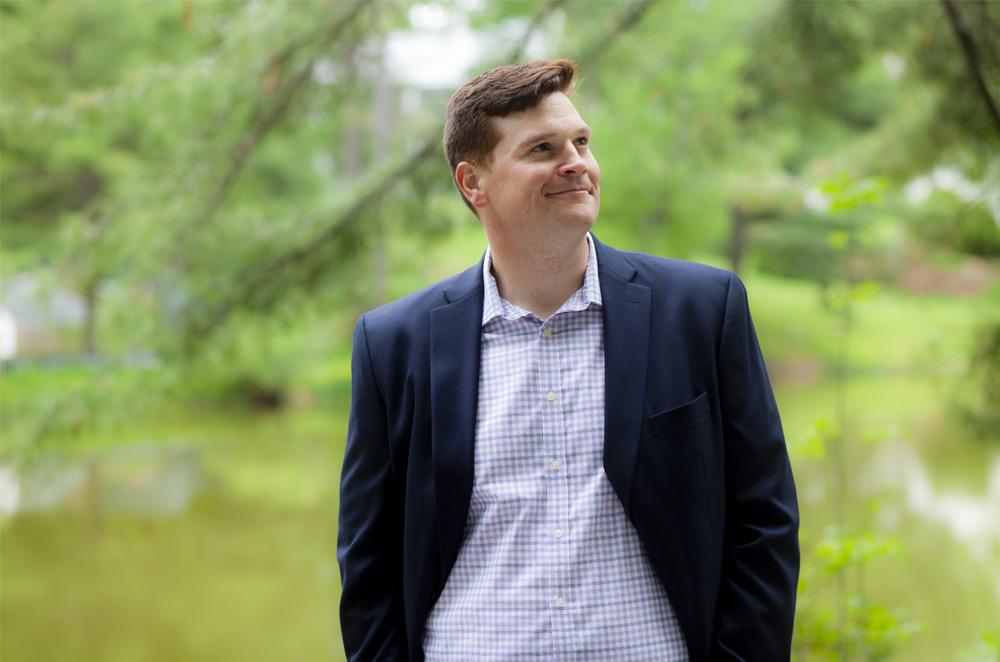
"I like to think we are filling a void in the community and letting other people know there is a support network for them. Knowing that Tuck students were helping to fill that void is a meaningful thing."
—Dennis Gallagher T’21
Dennis Gallagher T’21 will never forget the day he got into Tuck. He got a phone call from Hanover the day before he expected to hear from the school. “I figured they were probably calling with good news,” he recalls. He came to Tuck to ramp into corporate leadership and community engagement, and he was advised to get involved with as many clubs as possible and to get to know everyone he could. He took that advice to heart, joining Tuck Stuff, Tripod Hockey, and the Consulting Club. After the pandemic began, he volunteered with Hanover Helpers, a group founded by T’20s that delivers groceries to the Kendal at Hanover retirement community. “I like to think we are filling a void in the community and letting other people know there is a support network for them,” he says. “2020 was a pretty lonely time, so knowing that Tuck students were helping to fill that void is a meaningful thing.”
Gallagher took every chance he had to be in class with students and faculty during the hybrid sessions, including a December mini (Quantitative Digital Marketing) and Tax and Business Strategy in the winter. “We had 20 of us spread out in Georgiopoulous,” he says. “It was the first moment of feeling normalcy in about a year.
Ten years from now, when Gallagher projects how he’ll remember doing his MBA during a global pandemic, he hopes to see it as a catalyst for a commitment to community involvement. “It would be great to look back and say it started because of the circumstances of 2020-2021,” he says. “If I could look back and see that, it would be a huge positive for me.”
